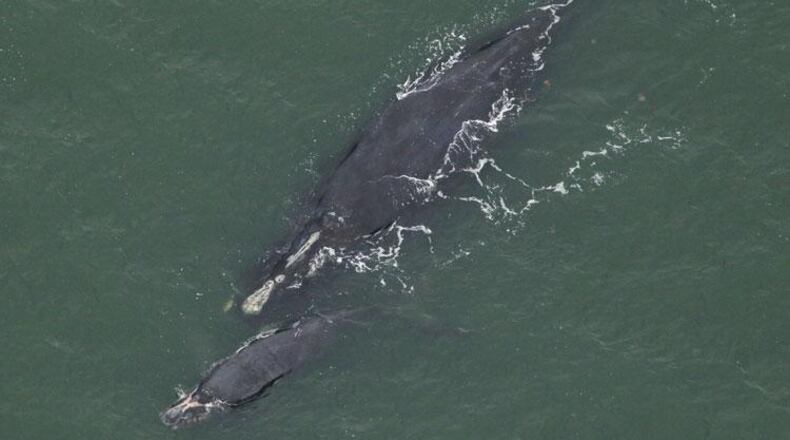The tragedy of North Atlantic right whale #1612′s calf is, by now too familiar. Born around Thanksgiving to a 38-year-old female nicknamed “Juno,” the first reported right whale calf of the 2024 season was announced to great fanfare. But by the start of the new year, it had become yet another grim statistic, sighted by anglers off Edisto Island, S.C., with grievous — and ultimately fatal — propeller wounds.
Biologists, including those with the National Oceanic and Atmospheric Administration (NOAA) Fisheries and Georgia Department of Natural Resources (GADNR), intensively monitored the mortally wounded newborn and its mother for two months, until the calf washed up dead on Cumberland Island on March 3. Too many whales — like Juno’s calf, most likely hit by a vessel between 35 and 57 feet long — are still being struck and killed by these smaller vessels.
For decades, Georgians have proudly shared the story of our coast’s role as the place where right whales come to give birth. But increasingly, this narrative is shifting. Our coast is the place where they come to die.
Credit: Handout
Credit: Handout
With only an estimated 360 individuals remaining on the planet, scientists tell us that we cannot afford to lose a single right whale per year to human causes. If the current rate of population decline continues, the species is expected to become functionally extinct within a matter of decades. Yet Juno’s calf was one of four — a reproductive female, a juvenile female and two newborn calves — killed or seriously injured by vessel strikes in southeastern U.S. waters during the most recent calving season alone.
The faster a vessel is traveling when it hits a large whale, the higher the likelihood that the whale will suffer serious injury or death. Studies show that reducing vessel speeds to 10 knots in areas of high right whale and vessel traffic overlap substantially reduces the risk of strikes and could reduce the risk of death up to 90%. Such strikes also pose significant safety risks for humans, especially when traveling in smaller vessels.
In May, One Hundred Miles and 21 other organizations and conservation leaders, representing more than 100,000 Georgians, came together to urge the Biden administration to immediately finalize a new federal rule proposed by NOAA Fisheries to reduce vessel speeds at certain times and locations to help ensure right whales’ survival.
The rule is safe and effective — and urgently needed. Unfortunately, powerful interest groups and their allies in Congress have continued to spread misinformation about its potential impacts and are actively working to delay its implementation.
U.S. Rep. Buddy Carter, R-Ga., is attempting to hamstring the very agency responsible for protecting our whales. Carter’s proposed National Defense Authorization Act amendment would prevent NOAA from implementing the new rule for more than a year, delaying these necessary protections from going into effect for at least the next two calving seasons — or even longer.
House debate on the Defense bill is expected this week, and the Carter amendment could receive a vote any day.
We Georgians have a proud history of working together to protect our wildlife and other natural resources, and we recognize what’s at stake if we fail to act. Carter’s Defense amendment would be tantamount to a death sentence for our state marine mammal.
Time is running out to save North Atlantic right whales from extinction. The Carter amendment should be defeated, and the Biden administration should immediately finalize its new rule to throw this beloved species the lifeline it so desperately needs.
We cannot let this species go extinct when the solution to the problem is within our grasp.
Megan Desrosiers is the president and chief executive of One Hundred Miles, Georgia’s coastal advocacy organization. Founded in 2013, One Hundred Miles works to protect and preserve the wildlife, landscapes and communities along Georgia’s 100-mile coast.
About the Author
Keep Reading
The Latest
Featured



